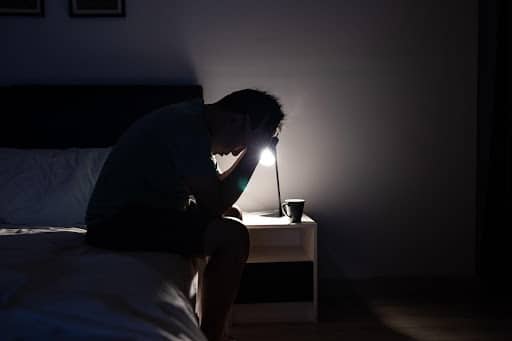Even in the happiest of times, overthinking at night is not uncommon. You get into bed, the house is quiet, you feel tired, and your guard is down. This creates an opening for rumination. Your thought process could begin on a positive note but can soon transform into something more obsessive. Before long, you’re caught in a cycle of bad memories and fears about the future.
Now, take this tendency and add in the element of grief. You’re dealing with a loss—perhaps working all day to avoid crying. Then you get into bed. The house is quiet, you feel tired, and your guard is down. This creates an opening for an escalation of grief.
So, Why Does Grief Feel Worse at Night?
Rumination is a major factor in nighttime grief, but it’s not the only one. Example:
1) It’s the End of the Day
As mentioned above, you’ve expended energy all day keeping it together and keeping busy or distracted. The floodgates have to open at some point.
2) Nighttime Is Quiet and Dark
Simply put, there are fewer distractions. You don’t have nearly as much to keep your mind busy. If you live alone, this reality is heightened. Also, it’s darker at night, and the darkness has long been known to impact one’s mood. Consider the common issues of Seasonal Affective Disorder or SAD.
3) It Can Create Insomnia
This is a chicken-or-egg situation, but most commonly, nighttime grief is the catalyst for sleep disturbances. As a result, disturbances like insomnia increase the likelihood of grief being more intense in the evening.
4) You May Be Grieving a Nighttime Presence
The person who died or is gone could have been someone with whom you spent your evenings. The possibilities are broad (partner, child, roommate, parents, etc.). Suddenly, they are not there at night, and the sense of loss becomes deeper and more profound. Lying alone in bed can trigger intense emotions.
What to Do When Grief Feels Worse at Night
Here are a few suggestions for this challenging scenario:
Maintain Basic Sleep Hygiene: For example, stay in a regular sleep routine when it comes to what time you go to bed and what time you wake up. Do not use tech devices in bed; ideally, power them down at least 30 minutes before bedtime. Do not consume caffeine or alcohol before sleeping. In fact, be very wary of using any type of medication or self-medication to help you sleep. Talk to a professional before this becomes a habit.
Create Busier Nights: You can “distract” yourself in a fun, low-stress way. Art and crafts, games, puzzles, and reading are all good examples. If you feel the energy to do so, take a walk or visit with someone you know.
Go to Bed When You’re Tired: This is a delicate balance. You very much want to keep a regular routine, but you also don’t want to lie down if you’re not sleepy. This rolls out the red carpet for overthinking. The distractions described above—especially reading and puzzles—can help get you more ready to sleep.
Ask For Help
Grief is a complicated and unpredictable process. Just when you think you’ve moved on, it can circle back and knock you for a loop. An ideal way to navigate these waves is by working with an experienced therapist. In the setting of your weekly sessions, you have the opportunity to process and resolve some of the painful emotions you are dealing with.
You can figure out new ways to manage grief in a productive, healthy manner. If grief—nighttime or otherwise—feels overwhelming right now, I urge you to reach out for support. At Onyx, our experienced therapists can help you along the path to healing and recovery.



